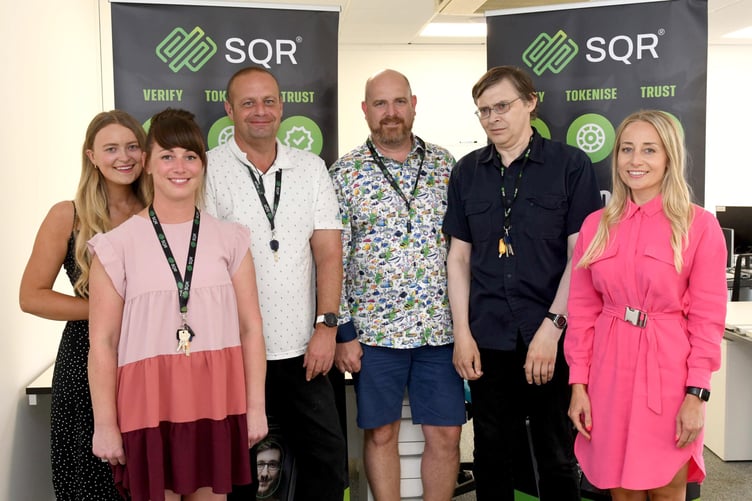Next week sees the final judging day for the Fintech Innovation Challenge where 17 finalists from around the world will demonstrate their products to an audience of judges, industry experts, and potential customers.
One of those companies which has gained a place in the final is Isle of Man based SQR Group who entered the Challenge with a ground breaking digital identity application they have been developing. This week it will go live in a soft launch, for several months of testing ‘in the field’.
When it is finally available commercially it has the potential to revolutionise the way we interact in any situation where we are sharing our personal data, both online and offline, making it both easier, and safer, to do so.
SQR’s chief executive officer Shelley Langan-Newton said: ‘Being able to prove who you are when you are using any sort of service is pretty fundamental to anything that you do nowadays whether that be online or in person.
‘There are so many different requirements where you have to say: “This is me and I am genuinely who I say I am, and I am real”.
‘That underpins so many different types of engagement at the moment and, going forward, in an increasingly digitised world, there will be even more.’
This is set against the background of the passage of the UK Government’s Online Safety Bill. This legislation will place duties of care on tech companies to protect users from harmful content. It’s aimed primarily at social media companies and search engines like Google, but could just as easily apply to, say, online gambling companies ensuring that their content was not available to children or to anyone with a gambling habit that might make them vulnerable.
Shelley says: ‘Not only is the Bill looking at fines for non-compliance but also prison time so business owners will have to really start showing that they are protecting people from harm.’
And, clearly, the more people have to enter personal data to show that they are, for example, old enough to view adult content, or place bets online, the more robust the processes will have to be to protect that data and that person’s identity. Which will probably make it more clunky and time consuming for users.
Enter the SQR product which appears to have everything, including making payments, covered in a single app. This will verify a person’s identity and ‘tokenise’ it, so that only the token is shared, rather than that person’s personal data.
SQR founder, Michael Dodd, explains how it works. He says: ‘There are two parts to this: once we’ve verified the identity of the individual we will issue an encrypted, secure QR code which contains their facial biometrics.
‘We also issue a 16-digit alphanumeric token and both need to be verified every time you use them. So, if you’re using your online presence, you use the sixteen digit number and verify it with your face, or, if you’re using the secure code in person you have to verify it with your face to use it.
‘You can also add payments to it: you can tokenise your credit card so that you can make payments as well, both online and offline.’
Once you have been through the process you can use the token system on different sites for different things.
Michael lays out a scenario where you might be going on holiday abroad: to book the flight you have to give your name, address, card and passport details, to one or maybe two airlines. You need to go through a similar process to book a hotel, hire a car and gain entry into the country.
As he says, it’s a dream for any fraudsters bent on stealing your identity and payment details.
The SQR app, he goes on to explain, aims to prevent all that. He says: ‘What SQR does is, when you are booking online, you give your sixteen digit token, smile at your camera and it’s done. When you arrive at the hotel, you scan your QR code and they give you your keys.’
Imagine, also, how simple a process it would be for a lawyer, or anyone offering professional financial services, to verify your identity and thus satisfy KYC and anti money laundering requirements.
So can SQR be the only company developing an app that can do all this?
Michael says: ‘There’s lots of companies that do bits of it, but there’s nobody that does all of it. And the beauty of ours is that it works on and offline which makes it unique: your QR code doesn’t need to be on a phone, it could be on a wristband or it could be on a card keyring.
‘So if you imagine it’s on a keyring and your payments are on it and you’re in a supermarket, you get to the till and scan your code, your payment’s done straightaway and it also knows you’re old enough to take your age-related items out without waiting for someone to come and sign off, so there’s lots of other benefits in this.’
One of these is the ways in which it can be used to support responsible gambling.
Michael explains: ‘We will be able to monitor a player’s spend, both on and offline, so this works for casinos as well as betting shops.
‘This is our USP – no one else has this. So, if you sign up with Sky Bet, they could monitor your spend with them but then, if you moved to a William Hill betting shop, and then you go into a casino, that spend is not being monitored.
‘We wouldn’t share that information on where you spend but we would share the cumulative total so that, as you hit a trigger or we could spot markers of harm, we could spot people who are potentially getting into financial difficulties or having issues and we’ll flag with the gaming companies as, potentially, these are people they would need to keep an eye on.’
There are also responsible gambling tools within the app so that a user could, for example, set a limit on his spend of £100.
Michael says: ‘Users would be able to opt out [of these tools] but, if you have opted out, you wouldn’t be able to bet and you wouldn’t be able to buy a Lottery ticket.
‘And something else that no one else has got is gambling curfews, so you can’t bet after ten o’clock at night.’
The SQR app is currently in a trial with GamCare, the charity which provides support for anyone affected by gambling problems.
The app can also streamline the online shopping process for retailers, whilst making it safer for consumers.
Michael explains: ‘The application has been approved by Visa and Mastercard with our payment service provider.
‘Because it’s face verified, it circumnavigates the Strong Customer Authentication (SCA) rules. So where it would normally send a message through to your bank to authorise the transaction, because your face authorises the transaction at point of sale,they know it’s definitely you and the bank will release the funds to the merchant the same day.
‘It’s got lots of behavioural biometrics in as well and these will know when you open your phone which hand you phone’s in, how you’re holding your phone, so before you even get in, it’s already checking that it’s you and then it’s looking at the IP and your location.’
The company has very recently become one of the first to be credited with the UK’s Trust Framework for individual identity. This sets out requirements so that organisations know what ‘good’ identity verification looks like. It is intended to align the UK with the European Digital Identity Wallet and the American NIST digital identity guidelines.
‘Essentially, it’s as trusted as a passport,’ says Shelley.
And she goes on: ‘It’s to keep people safe and it’s such an increasingly important thing to do. Essentially that is our mission, to make the world safe. And I don’t even mean the online world because our technology works offline as well.The world can be a safer place as the technology we’re bringing is not just to one market but many.’
The Fintech Innovation
Challenge
17 companies from across the globe have been selected for the Isle of Man’s flagship FinTech Innovation Challenge.
Solutions address a range of crucial issues facing the financial services industry, from blockchain and cryptography protections to AI-based business forecasting
FinTech Innovation Challenge represents the next step in the Island’s ambition to become a tech hub for businesses looking to bring their ideas to market
From automated gaming player protection, AI-based business strategy forecasting, Digital Identity Systems and wallets and online storage platforms right through to ESG auditing solutions and reward tokenisation, these are just some of the ideas that have been announced as finalists. The Challenge is a collaboration between Digital Isle of Man and Finance Isle of Man, and is supported by the Isle of Man Financial Services Authority and Deloitte.
With entries from Singapore to Switzerland, India to the US, the chosen businesses have been working closely with the Isle of Man Government, financial institutions, and other key stakeholders to develop and refine their solutions over the last three months. the cohort of 17 successful businesses selected from 45 applicants from around the world, to introduce solutions that will help boost the island’s thriving tech sector and position the Isle of Man as a leading FinTech hub.
Tim Johnston MHK, Minister for Enterprise, said:‘The FinTech Innovation Challenge is one of the tools to enhance the profile and eminence of the Isle of Man as a FinTech jurisdiction and it is anticipated that the Challenge will attract foreign investment to the Island, through international applications and interest.
The Challenge will culminate on June 29 during a Demo Day where each business will showcase their solution to an audience of judges, industry experts, and potential customers.





Comments
This article has no comments yet. Be the first to leave a comment.